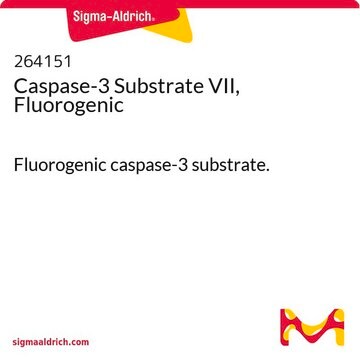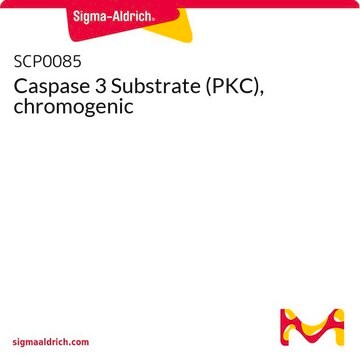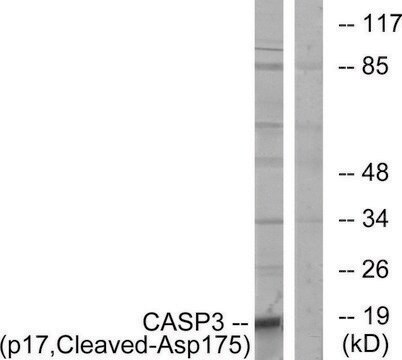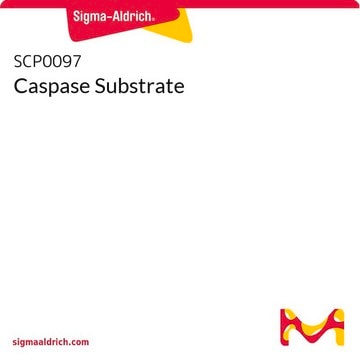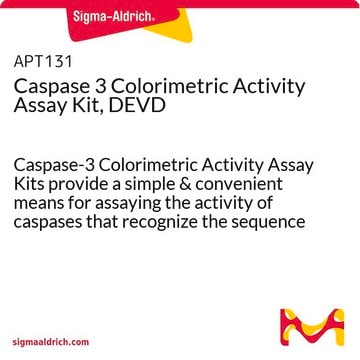All Photos(1)
About This Item
Empirical Formula (Hill Notation):
C31H39N5O12
Molecular Weight:
673.67
UNSPSC Code:
12352202
NACRES:
NA.32
Recommended Products
product name
Caspase 3 Substrate,
Assay
≥95% (HPLC)
form
lyophilized
composition
Peptide Content, ≥80%
storage condition
protect from light
storage temp.
−20°C
Amino Acid Sequence
Ac-Asp-Glu-Val-Asp-4M2NA
General description
Caspase 3 belongs to the family of cysteinyl proteases, which regulate apoptosis. It is encoded by CASP-3 gene. Caspase 3 is important for normal brain development. Caspase 3 is involved in growth stimulation of surviving tumor cells. It is associated with neuronal apoptosis in Alzheimer′s disease.
Application
Caspase 3 Substrate has been used to determine caspase activity in esophageal squamous cell carcinoma EC109 cell line.
Caspase 3, a cysteine protease activator of caspase 6 and caspase 7, metabolizes amyloid-β 4A precursor protein. Caspase 3 may be detected using a variety of chromogenic and fluorogenic peptide substrates built around the DxxD (asp-x-x-asp) sequences DMQD and DEVD such as Ac-DMQD-pNa (Acetyl-Asp-Met-Gln-Asp-p- nitroanalide), chromogenic; Ac-DMQD-AMC (Acetyl-Asp-Met-Gln-Asp- amino-4-methylcoumarin), fluorogenic and Ac-DEVD-4M2Na.
Storage Class Code
11 - Combustible Solids
WGK
WGK 3
Flash Point(F)
Not applicable
Flash Point(C)
Not applicable
Certificates of Analysis (COA)
Search for Certificates of Analysis (COA) by entering the products Lot/Batch Number. Lot and Batch Numbers can be found on a product’s label following the words ‘Lot’ or ‘Batch’.
Already Own This Product?
Find documentation for the products that you have recently purchased in the Document Library.
Customers Also Viewed
Emerging roles of caspase-3 in apoptosis
Porter AG and Janicke RU
Cell Death and Differentiation, 6(2), 99-99 (1999)
Caspase-3-generated fragment of gelsolin: effector of morphological change in apoptosis
Kothakota S, et al.
Science, 278(5336), 294-298 (1997)
Caspase 3-mediated stimulation of tumor cell repopulation during cancer radiotherapy
Huang Q, et al.
Nature Medicine, 17(7), 860-860 (2011)
Caspase-3 is enriched in postsynaptic densities and increased in Alzheimer's disease
Louneva N, et al.
The American Journal of Pathology, 173(5), 1488-1495 (2008)
Resveratrol-induced apoptosis is enhanced by inhibition of autophagy in esophageal squamous cell carcinoma
Tang Q, et al.
Cancer Letters, 336(2), 325-337 (2013)
Our team of scientists has experience in all areas of research including Life Science, Material Science, Chemical Synthesis, Chromatography, Analytical and many others.
Contact Technical Service

